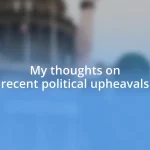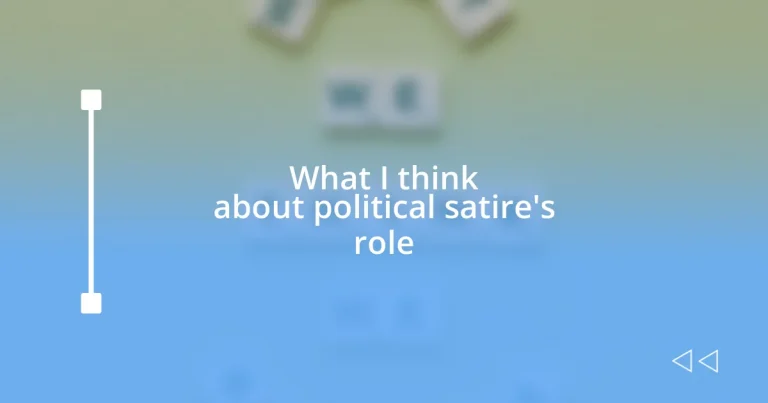Key takeaways:
- Political satire serves as a powerful tool for shaping public perception, fostering engagement, and prompting discussions about serious societal issues.
- Historically, satire has been significant in catalyzing social movements, from Ancient Greece to the modern era, by critiquing authority and challenging norms.
- Satirists face challenges in balancing humor with sensitivity, keeping pace with rapidly changing politics, and managing audience reactions to controversial topics.

Understanding political satire’s impact
Political satire wields a unique power that can shape public perception and provoke thought. I often find myself laughing at clever sketches or sharp parodies, but beneath that laughter, there’s a deep commentary on issues that often go unnoticed. How many times have you reflected on a situation after watching a satirical take on the news?
In my own experience, I remember watching a satirical news show that brilliantly highlighted government incompetence. The humor made the harsh reality more digestible, sparking conversations among friends and family. Isn’t it fascinating how laughter can open our eyes to serious topics, making them less intimidating?
Moreover, political satire can serve as a mirror, reflecting societal attitudes and prompting us to question our beliefs. When I see satire that resonates with my own frustrations, it hits close to home and makes me think—am I doing enough to engage with these issues? The emotional responses it draws can motivate people to become more active in their communities, transforming passive viewers into engaged citizens.
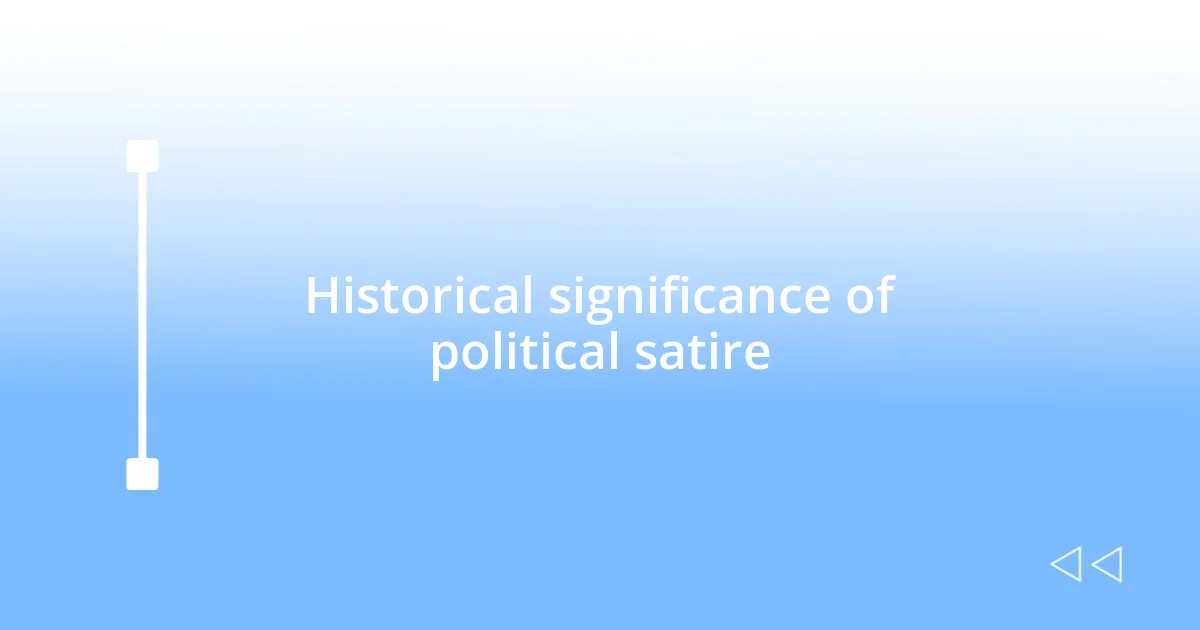
Historical significance of political satire
Political satire has played a significant role throughout history, often acting as a powerful tool for social commentary. I recall attending a history lecture where the professor emphasized the impact of satirical pamphlets during the French Revolution. Those provocative images and witty phrases challenged prevailing power structures and inspired revolutionary thought. It made me wonder—how many ideas that shape our world today were birthed from laughter and irony?
As I delve deeper into the evolution of political satire, I can’t help but admire its resilience. For instance, the feverish cartoons of Thomas Nast in the 19th century took on corruption and social injustice head-on. I remember flipping through old archives and feeling a rush of admiration for artists who used humor as their weapon against oppression. Such creativity sparked discussions that mobilized communities toward action, proving that satire can elevate the discourse beyond mere jest.
Moreover, there’s something profoundly relatable about the way satirists tackle public figures. I often think about the late-night shows that mimic government leaders. These performances foster a collective sense of camaraderie—who hasn’t shared a laugh over a sketch that perfectly captures a politician’s blunder? It’s as if we’re all in on the joke, using humor to handle the complexities of governance. This format has historically democratized political discussions, allowing more voices to join the conversation.
| Period | Significance |
|---|---|
| Ancient Greece | Satire was used by playwrights like Aristophanes to critique political leaders and societal norms. |
| French Revolution | Pamphlets and caricatures became vital in spreading revolutionary ideas and dissent against the monarchy. |
| 19th Century America | Cartoons by Thomas Nast highlighted political corruption, igniting social movements and public awareness. |
| Modern Era | Television shows like “Saturday Night Live” and “Last Week Tonight” engage broader audiences in political discourse through humor. |
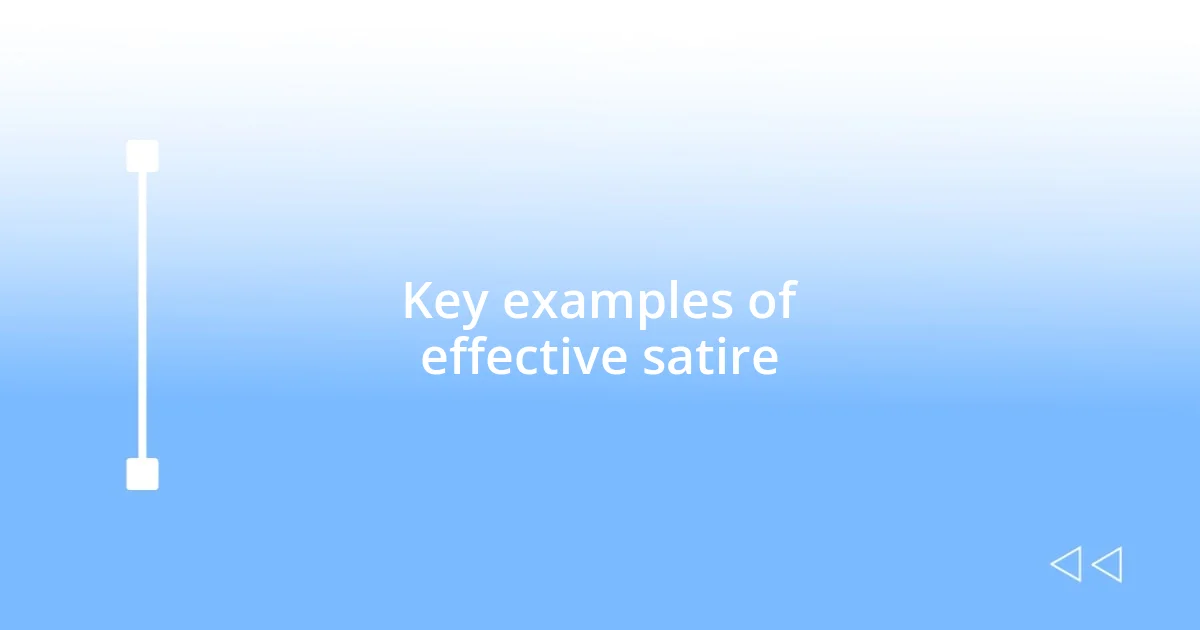
Key examples of effective satire
In my experience, some of the most memorable examples of political satire come from shows like “The Colbert Report.” I distinctly remember a segment where Stephen Colbert put on a persona so exaggerated that it perfectly parodied the media’s often absurd treatment of political news. It left me chuckling while simultaneously questioning how the mainstream covers critical issues. This blend of humor and insight is what makes satire so powerful; it encourages us to look beyond the surface and examine the world more critically.
Here’s a quick list of poignant examples that really resonate with the impact of satire:
- “Saturday Night Live”: Through its iconic cold opens, it often captures the essence of current political debacles, making audiences both laugh and think.
- “The Onion”: This satirical news website crafts absurd headlines that, while ridiculous, often reflect grim truths about our society.
- Jon Stewart on “The Daily Show”: His biting commentary provided a unique lens on politics, making important issues accessible to a younger audience.
- “Veep”: This comedic series uses its exaggerated characters to highlight the ridiculousness of bureaucratic politics, prompting laughs and groans of recognition from viewers.
- “Charlie Hebdo”: This French magazine’s bold, controversial cartoons challenge authority and provoke essential conversations about freedom of speech and societal norms.
From my perspective, these examples aren’t just funny; they’re transformative. They provoke thought, ignite debates, and sometimes inspire action. I often wonder who among my friends has felt as empowered as I have after poking fun at the more troubling aspects of governance through satire.
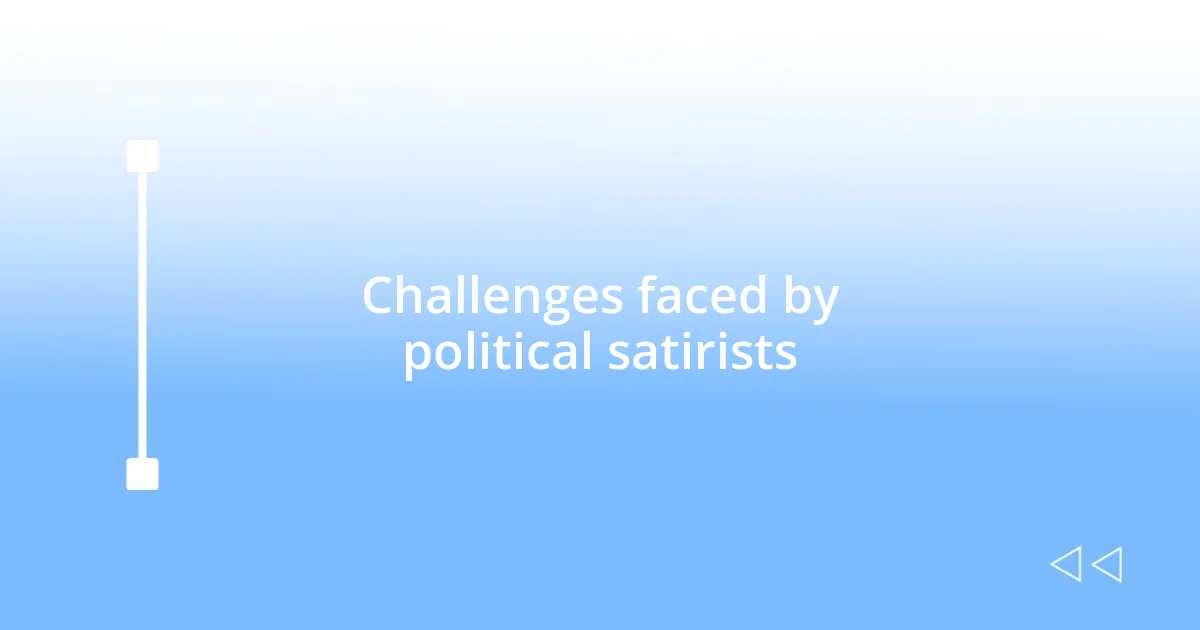
Challenges faced by political satirists
Political satirists often face the daunting challenge of balancing humor with sensitivity. I remember a time when a popular skit misfired, causing an uproar for mocking a tragedy, reminding me just how thin the line can be between cleverness and insensitivity. It makes me reflect—how can one evoke laughter while navigating the complex web of human emotions tied to political outcomes?
Additionally, the rapidly changing political landscape creates a whirlwind for satirists. Each day brings new headlines, and I often find myself wondering how they can keep up with such a frenetic pace. I admire those who manage to craft sharp commentary so quickly. It’s like hitting a moving target—you need both precision and foresight, traits that not every satirist can master consistently.
Moreover, there’s the constant specter of backlash lurking in the shadows. Satirists can find themselves at odds with not just the subjects of their humor, but also with audiences who may take offense. This reminds me of a stand-up comic I once saw who bravely tackled political topics, only to face a backlash that left him shaken. It begs the question: how much risk can a satirist afford to take without alienating their audience?







